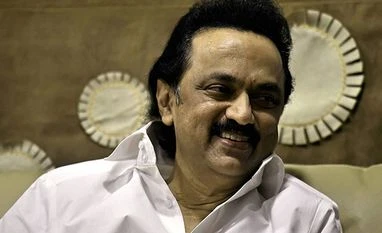When Telangana chief minister K. Chandrashekhar Rao called on the Dravida Munnetra Kazhagam’s (DMK) working president M.K. Stalin on Sunday, it set many tongues wagging. It is not always that a chief minister calls on an opposition leader from another state. At least when the opposition leader is not M. Karunanidhi – the DMK’s now inactive patriarch – whose reputation as a regional leader who fiercely fought for federal rights made him the centre of gravity for alliances aimed at challenging the status quo at the Centre.
Stalin, who inherited the leadership of the party, has worked hard to take the place of his father in the state and, evidently, outside it too.
Last year, he brought several anti-BJP leaders together to celebrate the diamond jubilee of Karunanidhi’s entry into the Tamil Nadu assembly. When questioned about not inviting BJP leaders, Stalin said the BJP was keen on destroying the Dravidian movement in the state and hence he “did not want to embarrass them by offering them a space on a Dravidian platform”.
By endorsing on Twitter Mamata Banerjee’s efforts to bring together various political parties opposed to the “autocratic and anti-democratic rule of the BJP”, the DMK leader indicated that he might be open to a third front. “The DMK has always stood for the unity of regional parties and stronger federal co-operation,” he had tweeted.
KCR’s visit and lunch at Stalin’s residence has further fuelled speculation about a third front in which Stalin, like his father did in 1996, could take a lead role.
That was also the year Karunanidhi – a familiar face across India for his opposition to Indira Gandhi’s Emergency – regained national attention as he was instrumental in forming the Third Front government, led first by H.D. Deve Gowda and then Inder Kumar Gujral, that was supported by the Congress from outside.
For now, however, the leaders of the prospective front are not keen to raise expectations and have even been dismissive of the idea.
Terming the front a creation of the media, Rao said that he was not suggesting any alignment of parties.“I am very clear in my mind that it will be the alignment of the people of India, the masses and farming community and the unemployed youth,” he said.
Stalin too said it was too early to talk about elections.
DMK leaders, however, are of the opinion that it is important to think of political developments beyond mere electoral alliances. “The discussion has revolved around bringing parties who support increased state autonomy, secularist principles and financial devolution to form a pan-Indian anti-BJP front,” said Manuraj Shunmugasundaram, the DMK’s spokesperson.
Shunmugasundaram further said the party might even convene a conference on state autonomy like the one held in the 1970s. “Of course, we have never said we are against the Congress. You may remember Rahul Gandhi did attend the diamond jubilee celebrations.”
Observers feel that Stalin’s interactions with Banerjee and Rao could be an attempt to assert himself as a leader of national stature. “He is just beginning and has a daunting task ahead. I am not surprised that Stalin wants to cut his teeth in national politics. It is expected of him,” said S. Kosalram, a senior Tamil journalist.
Shunmugasundaram, however, said that despite the party’s lack of presence in parliament – the 2014 election saw the All India Anna Dravida Munnetra Kazhagam winning 37 of the state’s 39 seats with the BJP and the Pattali Makkal Katchi winning one each – the DMK still enjoys a national stature. “We don’t have enough presence in both the houses of parliament, but if people still reach out to the DMK, it speaks a lot about our commitment to federalism.”
With anger against the current BJP dispensation resonating in many states across the country, more so in the southern states, observers think the stage is being set for the creation of a formidable anti-BJP platform. Shunmugasundaram concurred: “This is only a categorical consolidation of voices against the autocratic regime of the BJP”.
Not surprisingly, the Congress, which has allied with the DMK in the past, sees Stalin’s forays into national alliance building as a positive development. S. Jothimani, spokesperson of Tamil Nadu Congress Committee, said, “This is certainly a reaction to the BJP’s consistent efforts to undermine state rights. I don’t see the meetings as suspicious or negative. It has only strengthened the opposition to the BJP.”
Jothimani also says that in many states, there is no straight contest between the BJP and the Congress. “In several states the fight is between the BJP and the regional parties. So we see this as perfectly legitimate and fair. In fact, it strengthens our single point agenda – to remove the BJP from power.”
For Shunmugasundaram, this is about repeating the successful #GoBackModi campaign in Tamil Nadu. “We think more states want to emulate us.”
Kavitha Muralidharan is an independent journalist. Published in arrangement with The Wire
Unlock 30+ premium stories daily hand-picked by our editors, across devices on browser and app.
Pick your 5 favourite companies, get a daily email with all news updates on them.
Full access to our intuitive epaper - clip, save, share articles from any device; newspaper archives from 2006.
Preferential invites to Business Standard events.
Curated newsletters on markets, personal finance, policy & politics, start-ups, technology, and more.
)